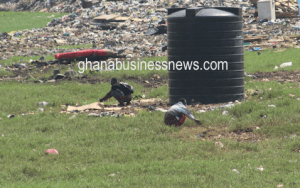M-CODe urges government to allocate more in budget for sanitation in schools
 The Media Coalition against Open Defecation (M-CODe) has called on government to make adequate budgetary allocation for the operation and maintenance of water and sanitation facilities in schools.
The Media Coalition against Open Defecation (M-CODe) has called on government to make adequate budgetary allocation for the operation and maintenance of water and sanitation facilities in schools.
The appeal followed reports that toilet facilities in schools could only be properly maintained and operated with constant supply of toilet papers, soap and water.
The call was made at a news conference organised by M-CODe, the Coalition of NGOs in Water and Sanitation (CONIWAS), World Vision and the Greater Accra Metropolitan Area (GAMA) in Accra, to discuss the “Operation and Maintenance of School Sanitation Facilities.”
Mr Cecil Nii Obodai Wentum, a member of M-CODe, said even though, through the GAMA sanitation project, toilet facilities were built for many schools, problems of maintenance remained a major challenge.
“Barely, a year after the facilities were handed to the school authorities, there are signs of maintenance challenges creeping in, which we fear, if not addressed immediately, some of the facilities will not function up to five years,” he said.
He mentioned the inability of janitors to keep the facilities clean, electricity supply to provide lighting and security as some of the challenges.
Meanwhile, he said, given the current restrictions in collection of fees from parents in public schools as a strict government directive, the school management committees and head teachers found it difficult to play those roles effectively.
Mr Wentum said school authorities sometimes pleaded with parents to contribute for the maintenance of the toilets,but majority failed to do so, which compelled the authorities to lock up the toilet facilities, forcing the pupils to revert to open defecation when at school.
Even though the capitation grant, he explained, was expected to cover maintenance of school facilities (including water and sanitation facilities), the total grant of GH¢9.00 per pupil each year was inadequate.
According to the GAMA project, it will require an estimated cost of GH¢45.00 per pupil every year to operate and maintain a six-seater water-closet toilet used by between 300 and 350 students.
Dr Doris Yaa Dartey, the Patron of the M-CODe, urged religious groups, civil society organisations, and traditional authorities to pay critical attention to issues of open defecation and sanitation in general.
“How much are you an Honourable or a decent man or woman if after you defecate, it is collected into water bodies and you don’t show concern. It is not only about those who practise open defecation,” she said.
Focusing on the sanitation value chain, Dr Dartey said the incidence of open defecation was now scarier than the statistics showed. He described it together with indiscriminate littering of the environment as a ‘national disaster’ which needed to be addressed with speed.
“Even though, people who practise open defecation know that it is wrong, uncivilized and unrespectable, they still do it. To actually lay claim to civilisation as a country, we must fix this disgusting matter of open dedication and respond to nature’s call in dignity,” she said.
The Patron urged the state to find innovative ways to process human excreta for useful products such as; biogas for electricity.
Mr Yaw Atta Arhin, the Vice Chairman of CONIWAS, said 32 per cent of people living in the country practised open defecation daily, and 30 per cent of public schools didn’t have access to toilet facilities.
According to a UNICEF report, every gramme of faecal matter contained 10 million viruses, one million bacteria, and one thousand parasites, he said, adding that, that was dangerous to human health.
“Poor sanitation costs the nation $279 million, while open defecation costs $79 million annually. Therefore, fighting the problem will save the country huge sums of money,” he said.
He recommended the setting up of an initiative to force Metropolitan, Municipal and District Assemblies to resolve sanitation problems in their areas.
He also called on the government to establish a National Sanitation Authority with laid down strategies, to help control sanitation problems in the country.
Source: GNA
